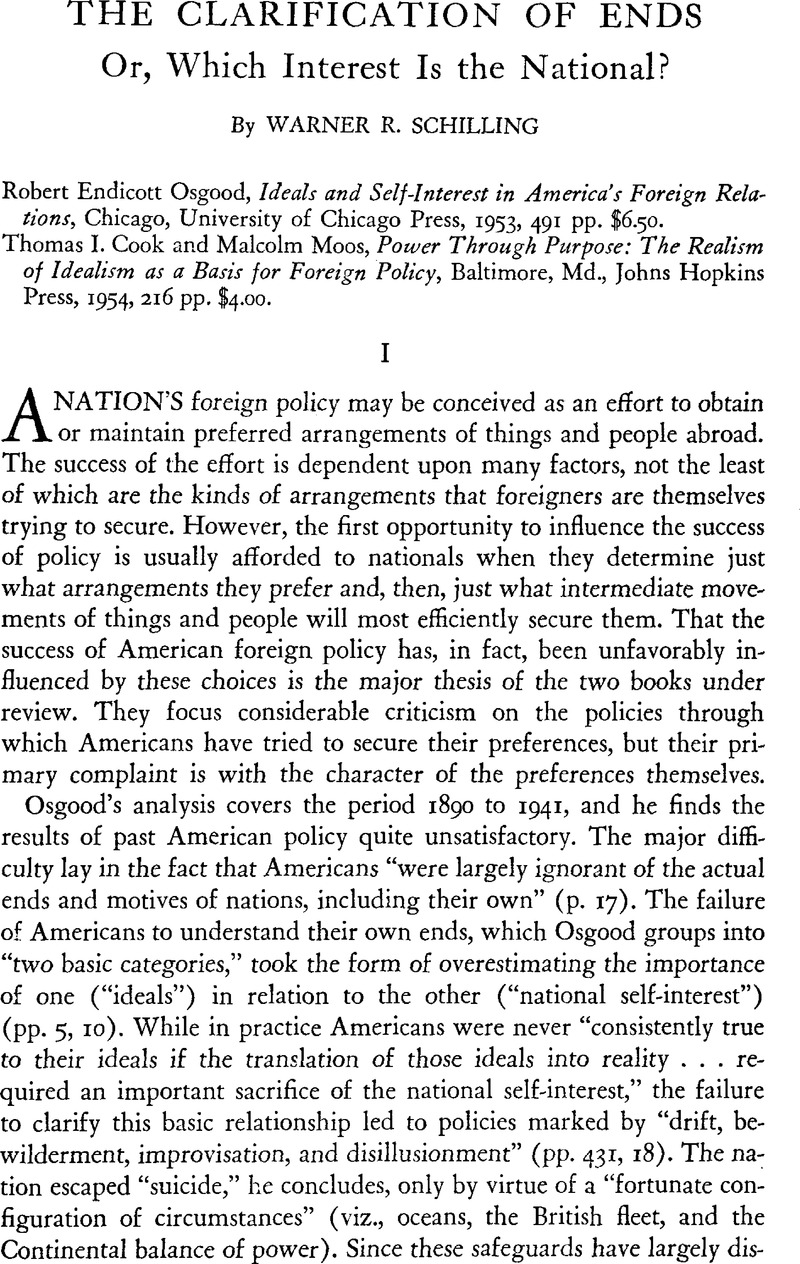Article contents
The Clarification of Ends Or, Which Interest Is the National?
Published online by Cambridge University Press: 18 July 2011
Abstract

- Type
- Review Articles
- Information
- Copyright
- Copyright © Trustees of Princeton University 1956
References
1 As for Osgood's book, both Morgenthau in his Foreword and Osgood in his Preface avoid reference to intellectual similarities and differences, and the present reviewer is not going to undertake the task. It is worth noting, however, that Osgood's ideas seem to have much in common with those of Reinhold Niebuhr. See Tucker, Robert W., “Faidi, Reason, and Power Politics,” World Politics, v, No. 3 (April 1953), pp. 392–413.CrossRefGoogle Scholar
2 For Wilson's remark and his expectations of rivalry with Britain, see Hurley, Edward N., The Bridge to France, Philadelphia, 1927, p. 313Google Scholar; Baker, Ray Stannard, Wood-row Wilson: Lije and Letters, 8 vols., New York, 1927–1939, VIII, pp. 365–366Google Scholar; and Daniels, Josephus, The Wilson Era, 2 vols., Chapel Hill, N.C., 1944–1946, II, pp. 572–74.Google Scholar For the negotiations, see Papers Relating to the Foreign Relations of the United States: The Paris Peace Conference, 13 vols., Washington, D.C., 1942–1947, V, pp. 161–63; VI, p. 276; and XIII, p. 845.
3 Quoted in Nouer, Harley, The Origins of the Foreign Policy of Woodrow Wilson, Baltimore, Md., 1937, p. 515.Google Scholar
4 See, for example, Wilson's notation on a copy of Smuts's mandate proposal of January 29, 1919: “I could agree to this if the interpretation in practice were to come from General Smuts. … [But difficulties with Japan] loom large. A line of islands in her possession would be very dangerous to the United States.” (House Collection, Yale University Library.) Wilson's, counter-proposal is mentioned in The Varis Peace Conference, op. cit., V, p. 140. The point is developed in full in the present writer's doctoral dissertation, “Admirals and Foreign Policy: 1913–1919” (Yale University,1953).Google Scholar
5 House “thought there would be three, China dominating Asia, Russia dominating Europe and a part of Asia, and America dominating the Western World and perhaps the English speaking colonies.” See the Diary of Edward M. House, August 30, 1914, House Collection.
6 See also Seymour, Charles, The Intimate Tapers of Colonel House, 4 vols., Boston, 1926–1928, I, pp. 293, 298–99.Google Scholar It should be noted that Wilson also anticipated costs to die American way of life if America should enter die war. See Osgood, pp. 241–42,241n.
7 For a demonstration of some of the difficulties involved and the development of an alternative approach, see Wolfers, Arnold, “The Pole of Power and the Pole of Indifference,” World Politics, IV, No. I (October 1951), pp. 39–63.CrossRefGoogle Scholar
8 Letter to Senator William, J. Stone, February 24, 1916, as quoted in Osgood, p. 187.Google Scholar
- 2
- Cited by




